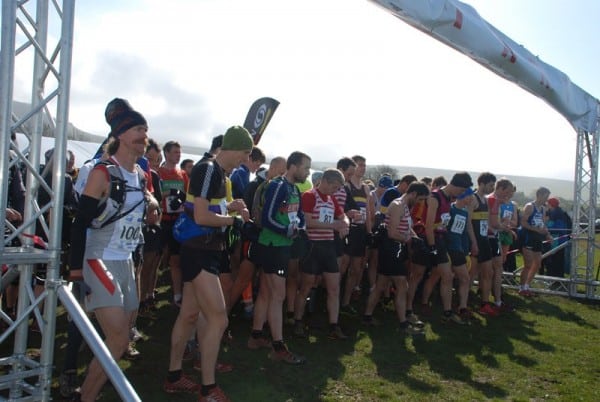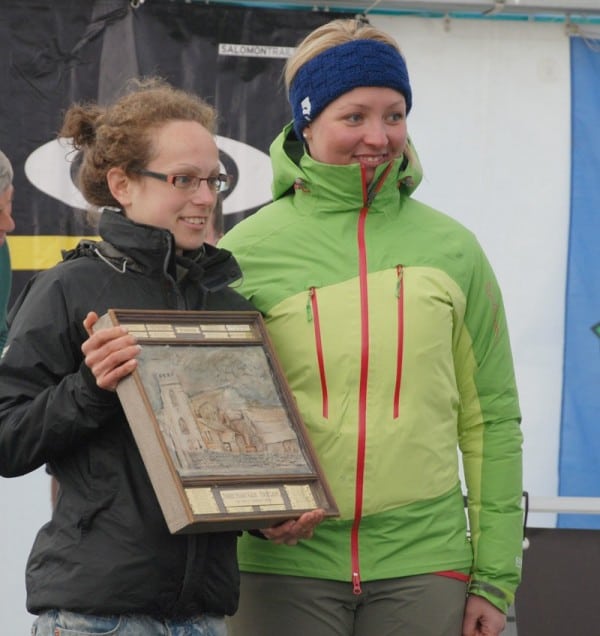[This article is the first of iRunFar’s in-depth European trail race coverage provided by Matt Ward of Mud, Sweat & Tears. Aside from Matt’s coverage, iRunFar’s US team will be traveling to Europe for select races. Next up, Transvulcania and the Zegama Marathon two and three weekends hence. Check back in at iRunFar throughout the season for the scoop on top Euro races. – Bryon Powell, Editor-in-Chief]
As the dust (well, pretty much mud) settled on the 58th running of one of England’s classic fell races this last weekend, the Yorkshire Three Peaks Race will be remembered in 2012 for high winds and even higher drama, as two new names were etched onto the classic trophies that make this event a ‘monument’ of mountain running.
Although you get 1,000 competitors, the Three Peaks still feels local. The atmosphere is as warm as the log fire that burns in the The Crown pub in Horton-in-Ribblesdale, and the humble nature of fell running pervades the proceedings at this iconic race, described by Rickey Gates as a “wonderful experience.”
In what will be fondly remembered as a sunny but breezy day in the Yorkshire Dales, the men’s field was stacked will fell running talent from across the UK, and with the US’ Gates throwing his hat into the ring there was an international tinge. This was added to by emerging trail talent Emelie Forsberg from Sweden, who had made the trip to the UK for her first experience of fell running. Rickey unfortunately had to retire from the event at around 10 miles, however Emelie found fortune on the fells of Yorkshire, finishing a brilliant second in the women’s race.
After several days of heavy rain, Saturday dawned dry, but there was a bitter cold easterly wind and the temperature barely lifted above three degrees on the summits. The 745 starters from an entry of 1,000 found themselves battling against showers of sleet. The 3 Peaks is billed as “the Marathon with Mountains” because of its 5,270ft of ascent, and a quick look at the role call of winners over the years shows that true marathon runners such as Ron Hill were able to win the race. However, this event requires the endurance of a marathon runner, but the ability of a mountain runner to win it.
So it was fitting that a Scottish hill runner with a growing international reputation beat world-class opposition to take the win, following in the footsteps of his father in winning the event. Joe Symonds, 28, of Hunters Bog Trotters in Edinburgh, finished the 23-mile race over the summits of Penyghent, Whernside, and Ingleborough in the Yorkshire Dales in 2hrs 55mins 58secs and he must win the race, which has Salomon as its principle sponsor, twice more to equal the achievement of dad Hugh, who won in 1984, 1985, and 1987.
They are the second father and son to win the Three Peaks Race. Harry Walker, of Blackburn Harriers, won in 1977, 1978 and 1981. His son, David, of Clayton-le-Moors, won in 2003.
Joe Symonds’ father was not there to see him beat some of the race favourites, including last year’s winner Tom Owens, of Shettlestone Harriers in Glasgow. After finishing the race at Horton-in-Ribblesdale, near Settle, Symonds was not able to get a mobile phone signal to tell his father of his success. Joe said, “When I contact him, he will be quite happy. In fact, I think it will make his day.”
But it later emerged that Hugh Symonds, who was in New Zealand, was monitoring his son’s progress via the SPORTIdent website on the Internet and knew he had won. Joe said, “It’s nice that they were taking such an interest on the other side of the world.”
Having won the first round of the British Championships in 2012 at the Coledale Horsehoe race in Cumbria, the Salomon Trail Team UK man came in a confident mood, and along with 2011 winner Tom Owens and Ricky Lightfoot, was prominent throughout the 23-mile race.
Symonds, who finished ninth in the Three Peaks in 2008 when it incorporated the World Long Distance Mountain Running Challenge and retired at the Hill Inn checkpoint last year suffering from blisters and what he described as “a lack of fitness,” was modest about his success. He picks up the story:
Although I was brimming with confidence after my win at Coledale, I approached the Three Peaks Race this year with plenty of caution and respect. 24 miles is a long way, and this course will find its way of eking out any weaknesses you may have, as I found out last year when I abandoned the race at Hill Inn with my legs in pieces. As many who have done the race will doubtless know; if you are already hurting badly after descending Whernside, the steep climb up the final hill, Ingleborough, and 6-mile descent to the finish in Horton-in-Ribblesdale will really make you pay.
When I got to the checkpoint at Hill Inn I said out loud to myself, “This is where the race starts,” taking my Dad’s advice. The lower slopes of Ingleborough are not steep and the path was dry so I was able to keep up a decent pace. Glancing at my Suunto GPS running watch I could see I was running at about 6:30 minutes per mile and I remember thinking that they wouldn’t catch me if I kept this up.
I started to really struggle in the last 2 miles of the race. Running in to the wind, over tricky sections of limestone pavement, with my energy levels rapidly expiring, I really had to dig deep. To say I was elated when I crossed the finish line does not do it justice.
Taking the train back to Inverness from Ribblehead on Sunday morning, as the train passes through stunning Dales scenery, I now have a chance to reflect on what this victory means to me. I was only four years old when my Dad won this race for the third time and I must admit that I can’t remember it. But I do remember seeing the trophies proudly displayed in the house and getting an impression of how important those victories had been to him – probably all the more so because of the recent legendary victories by Jeff Norman and Kenny Stuart.
Joe’s full post-race debrief is a real great listen, too!
Second and third places went to two runners making their first attempts. Carl Bell, 29, of Howgill Harriers, was second in 2hrs 57mins 29secs and Rob Baker, 34, of Dark Peak Fell Runners, finished third in 2hrs 58mins 01secs.
Fourth was Ricky Lightfoot, of Ellenborough Athletics Club in West Cumbria, in 3hrs 00mins 21secs. Karl Gray, 42, of Calder Valley Fell Runners, had a notable race taking the male veteran over-40 title and fifth place in 3hrs 01min 19secs. His time was a new V40 record over the current course.
Andrew Davies, of Mercia Fell Runners Club, was sixth in 3hrs 02mins 05secs. Rob Jebb, of Bingley Harriers, who won the Three Peaks in 2005, 2006, 2007 and 2009, finished in seventh place in 3hrs 02mins 55secs ahead of last year’s winner Tom Owens, of Shettlestone Harriers in Glasgow, in 3hrs 04mins 56secs.
For Gates it was a bittersweet debut in the UK. After starting off in the lead group, the San Francisco-based runner started to feel the affects of a calf/hamstring injury, which has dogged him pretty much all winter, and even a shoe change wasn’t enough to relieve the pain forcing him to drop out of the race. You can hear more in his post-race interview via Mud, Sweat and Tears.
As well as winning the race, Hunters Bog Trotters also supplied the fastest woman competitor. Sarah O’Neil, 25, finished in 3hrs 28mins 43secs. O’Neil’s time on Penyghent summit was 20 seconds ahead of the second placed female Emelie Forsberg, of Salomon International, who finished in 3hrs 43mins 52sec.
Forsberg, a biology student from Tromso in Sweden, who sat an exam the day before the Three Peaks, fell further behind at Ribblehead and O’Neill was 4mins 38secs ahead on Whernside and reached Ingleborough 12 minutes ahead of the newcomer. Even more impressive was the fact that O’Neil had finished 14th at this event in 2011, a full 30 minutes slower than her 2012 time. She stated, “It was tough. I started off quite strongly and with Emelie behind me I was running scared for much of the race.” Listen to her post-race reaction. Third was Welsh international fell runner Sarah Ridgway, 38, in 3hrs 45mins 51secs.
It was an indication of the difficult conditions that only 641 of the 745 starters finished the race. That stat is also a nod towards the importance of the race to those who dedicate themselves to the sport of mountain and fell running. Many see the event as a challenge and not a race, to complete this one is to win.
But the race is perhaps best summed up by one anonymous competitor who has completed almost twenty 3 Peaks events, “What brings me back to run this race each year? The nervous apprehension as the announcer counts down to start time. The spectators whose cheers can lift a weary and footsore runner through a bad patch. And of course the finish, with the field in sight from half a mile away and the tannoy announcing your arrival on the final run in. It is always a grand day out and it is in Yorkshire.”
Full results are available.
Call for Comments (from Bryon)
- If you’ve ever run Three Peaks, please share your experience!
- If you’ve not, is this race on your list, and why?





